Open Source Democracy: How Online Communication is Changing Offline Politics
Filed under book | Tags: · democracy, open source, participatory culture, politics

The ‘open source’ movement in computer software is self-organising and decentralised; it also values participation over power. Douglas Rushkoff, the leading US commentator on digital culture, argues that democratic politics should work in the same way.
Open Source Democracy: How Online Communication is Changing Offline Politics
By Douglas Rushkoff
Published by Demos, 2003
ISBN 1841801135, 9781841801131
66 pages
full view
Florian Cramer: Words Made Flesh: Code, Culture, Imagination (2005)
Filed under book | Tags: · art, art history, code, code poetry, computation, experimental literature, kabbalah, language, literature, philosophy, poetry, religion, software, software art, technology

“Executable code existed centuries before the invention of the computer in magic, Kabbalah, musical composition and experimental poetry. These practices are often neglected as a historical pretext of contemporary software culture and electronic arts. Above all, they link computations to a vast speculative imagination that encompasses art, language, technology, philosophy and religion. These speculations in turn inscribe themselves into the technology. Since even the most simple formalism requires symbols with which it can be expressed, and symbols have cultural connotations, any code is loaded with meaning. This booklet writes a small cultural history of imaginative computation, reconstructing both the obsessive persistence and contradictory mutations of the phantasm that symbols turn physical, and words are made flesh.”
Editor: Matthew Fuller, additional corrections: T. Peal
Published within Media Design Research programme, Piet Zwart Institute, Willem de Kooning Academy Hogeschool, Rotterdam
GNU General Public License 2; GNU Free Documentation License 1.2; Creative Commons Attribution-ShareAlike License 2.0
141 pages
Review: Tomáš Javůrek (Joinme, 2018, CZ).
PDF (updated on 2012-10-11)
HTML (added on 2013-7-1)
Sequel: Exe.cut(up)able statements: Poetische Kalküle und Phantasmen des selbstausführenden Texts (2011, in German).
Comment (0)Armin Medosch: Freie Netze. Geschichte, Politik und Kultur offener WLAN-Netze (2004) [German]
Filed under book | Tags: · internet, media, network culture, networks, open spectrum, politics, wireless networks

“In den letzten zwei, drei Jahren entstand eine Bewegung, welche die klassische Idee der Freenets, der freien Bürgernetze, mit der Technologie für Wireless Local Area Networks (WLAN) zu verwirklichen versucht. Diese freien drahtlosen Bürgernetze, engl. Wireless Community Networks bzw. Free Networks, die gleichzeitig spontan in New York, London, Seattle, Berlin, Hannover und weiteren Städten entstanden sind, bieten sich als alternative Modelle für eine nachhaltige Informationsökonomie an. Interessante Themen – Stichworte mobiler Lebensstil, War-Driving, Netz-Kartographie, Selbstorganisation und Dezentralität – werden aus einer Insiderperspektive spannend und lebensnah vermittelt.”
Publisher Heinz Heise, Hannover, 2004
Creative Commons BY-NC-ND 2.0 DE License
ISBN 3936931100
240 pages
PDF, PDF (updated on 2015-7-23)
Comment (1)
